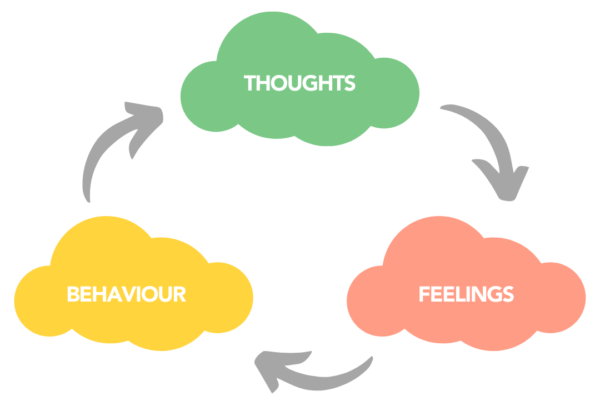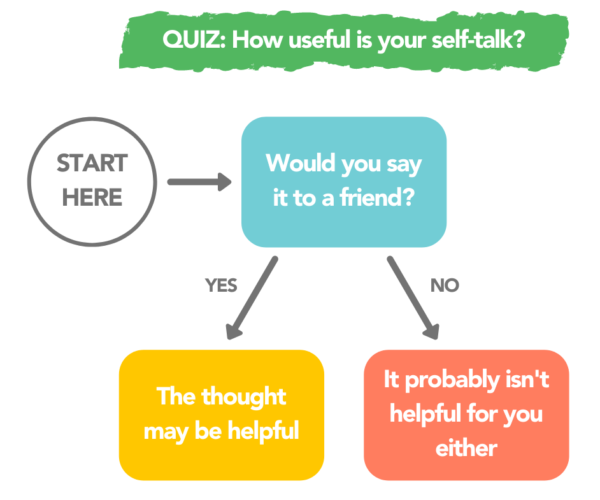
Have you ever had those little voices wafting around your head that seem to tell you exactly what you don’t want to hear? Maybe your inner self-talk is telling you that you’ll forget the words of a speech, or get a bad mark, maybe even flunk Year 12!
Those voices can sound really convincing and that’s exactly what we want to learn how to control, especially when you feel like your inner self talk is holding you back at school or in your exams.
To help our understanding, we got to chat to Jenny Baines, Head of Counselling at Western Sydney Uni, who helped us dissect the concept of self-talk and gave us some great tips to combat these negative thoughts.
Let’s begin!
What is self-talk?
The Different Kinds of Self-Talk
How Self-Talk is Holding You Back
What is self-talk?
Self-talk is, simply, the way that you talk to yourself. It’s the little voices that travel around your head when you’re trying to get to sleep, when you look in the mirror, when you’re taking a test or when you’re just sitting around doing nothing.
Self-talk is like your very own internal monologue. If you’re a regular play or theatre-goer then you’ve probably witnessed scenes where the characters will talk to the audience about their innermost thoughts and feelings without revealing it to the other characters. This is kind of like the self-talk that goes on in your head. You’re the only one that can hear it and sometimes you won’t want to reveal it to your friends and family.
The technique is used a lot by Shakespearian characters to disclose to the audience their thoughts, motives and intentions.
It’s like when Romeo reveals his love for Juliet or when Macbeth admits that he’s struggling with his own guilty conscience. Pretty much what I’m trying to say is that you’re basically a Shakespearian character in your own play. Cool, right?
Breaking Down Your Thought Process
Jenny gave us a rundown of one of the techniques that she uses to help students break down their thought process.
“When I’m working with students I often do the thoughts, feelings, behaviour cycle. So, you’ve got an arrow between your thoughts, feelings and behaviour and then back to your thoughts. So, an example of that: the thoughts you have will impact the way you feel and then the way you behave,” Jenny said.

What are the different kinds of self-talk?
It’s good to know that self-talk isn’t a negative word by nature. In fact, Jenny told us that it’s a really common occurrence and there are generally two distinct types of self-talk.
“We all have self-talk. Sometimes it’s conscious and sometimes it’s not. Some of us have been doing it since we were children.” Jenny said.
She added, “There’s probably two types of self talk — there’s positive self talk which can actually motivate us with learning and study, it can energise us and keep up focused. There’s also a more negative and unhelpful self-talk which can increase our stress levels, perhaps block learning and memory, reduce our confidence and it can lead to rumination or overthinking things all the time. That can be unhelpful. So, it’s useful to find out what your self talk is.”
Oftentimes, the self-talk that makes us most anxious or stressed is the negative kind. Let’s break them down a little further:
Positive Self-Talk
“The positive side of self talk is that it can help us achieve. If you think about it, say, with high-achieving students they use their inner critic to keep them going and to keep them motivated. Where it becomes not helpful is when you’re a high achieving student and you say to yourself ‘I can’t fail, I have to do it right every time,’” Jenny explained.
So, there are two ends of the spectrum and your self-talk or inner critic probably fits along that spectrum somewhere. As we can see, self talk isn’t always negative and it’s also never permanent!
You’ll probably move up and down the self-talk spectrum depending on your mood, confidence, your past interactions, sleep, exercise, food and pretty much every other factor.
Positive self-talk are the voices in your head that make you feel good, capable and motivated! Even if you have a tricky day, with positive self talk, you can usually look past it and persevere.
Examples
Some examples of positive self talk may include:
“I’m really proud of all I’ve achieved today.”
“Even though this situation didn’t provide me with the outcome I had hoped for, I’m still very glad that I gave it a shot because I learned a lot about myself!”
“Doing this makes me anxious but I know that it will make me stronger if I push through.”
Even if you’ve felt impacted by long-term negative self-talk, you can still put strategies in place to change your way of thinking. You can learn to control your thoughts (which we’ll get to a little later).
Jenny added, “So everybody’s got that critic. It’s just some people have got it a lot louder than others and they listen to it really closely while others have ways of stopping the negative self-talk.”
Negative Self-Talk
A lot of the time, the most common form of self-talk is a distinct negative voice.
While negative self-talk can feel like a pretty isolating experience when you’re stuck in your own head, it’s always good to be reminded that, actually, so many other people are struggling with the same thing.
Let’s go back to our Shakespeare metaphor. If all the characters in your life replaced their inner monologues with outer monologues and you became privy to everyone else’s self talk, you’d discover pretty quickly that you are not alone in your thoughts and feelings.
In fact, even the most positive people will have experienced negative self-talk but maybe they’ve learned their own personal way to combat it.
Examples
Some examples of negative self talk could include:
“There’s no point trying because I know I’m just going to fail.”
“I know that no one likes me.”
“I must be really stupid since I got these bad grades.”
Jenny explained to us why it can be common amongst students to experience this negative inner monologue:

Jenny told us that while there are methods that can ease this negative self-talk that you can utilise right now, it’s also common for people to become more confident in themselves as they get older. So, don’t stress if you’re feeling stuck in these thoughts.
Negative self-talk is a really tricky emotion to deal with. It can impact your confidence and self-esteem and while it can be difficult to reconfigure these thoughts, it is possible!
How Self-Talk is Holding You Back and What You Can Do About It
Your inner critic is clever in the way that it can make up really convincing situations as to why you shouldn’t do something.
Maybe your inner critic is telling you that you shouldn’t do this speech because you’re sure that you’ll stutter or forget what you want to say. Or maybe it’s letting you know that none of your friends like you anymore because they haven’t messaged you in a little while.
Or maybe you’ve received a few bad marks and suddenly you’ve convinced yourself that you’re incapable and should never have chosen a difficult subject to study for Year 12 in the first place. It’s a slippery slope!
Most of the time these made up scenarios are completely false. Jenny said that when our inner critic tries to tell us these things, it’s important to break them down and try really hard to apply pure logic to them.
“First, it’s a matter of being aware of what the self talk is, so what are you saying to yourself? What are the common things?” Jenny said.
She added, “Usually it’s a matter of listening to yourself and trying to tease out what the thoughts are and ask yourself, is that actually true? Is there evidence for the fact that I’m bad at public speaking? Is there evidence for the fact that nobody likes me?”
#1: The Courtroom Approach
Jenny also told us that it can help to envision how these thoughts may hold up in a courtroom. This way, you can imagine this negative self-talk being analysed by someone of strict independence and objectivity.
You’ll actually find that a lot of the time these thoughts sound pretty silly when you lay it out.
Let’s set the scene. A 5-star play by yours truly:
Judge: Can you please state your case?
You: Ehhhh, well, I don’t have any friends anymore because they haven’t messaged me in a couple days. I’m unlikeable and will never have any friends ever again. Ugh.
Judge: What?
You: Yeah, um, a couple days, no conversation. They hate me.
Judge: Right. Yes, um. Okay. Any other evidence?
You: Well, yes, actually. Last week when I saw them, one of them said that they’d message me soon and they haven’t. Not one single message. I must have done something really bad without knowing. I’ve probably severely offended everyone in the world. I’m doomed.
Judge: What could you have done?
You: I don’t know! Why are you asking me? All I know is that I’ve done something really wrong and everyone really hates me.
Judge: I’d like to now call your friend to testify. How do you plead?
Your Friend: Uhh, not guilty? I’ve just been really busy and it actually would have meant a lot if someone had contacted me first. I guess no one really cares about me.
Judge: What, no! Not you as well.
The jury was very confused and eventually got up to leave because this repetitive conversation went on for days. And then the audience applauded very very loudly.
This is a real situation that I have experienced (apart from the whole going to court thing, of course) and I was sure I had done something wrong when in reality everyone else was pretty much in the same boat.
The moral of the story is that a lot of the time the thoughts that are deterring us from living our lives or trying new things are usually totally baseless in the first place. Negative self-talk will continue to hold you back from reaching your full potential if you don’t put in the effort to challenge these misconceptions.
#2: Check with someone else
Jenny told us that another great strategy is to:
“Write down what the negative thought is and see if you can reframe it yourself. You could ask somebody you trust if there’s another way of looking at it. Think, is there another thought I could have about this? Or you could talk to a professional counsellor to work through them as well.”
“It’s important that young people get to that point they can actually talk to someone about it to see what would help break that cycle, because it can just pull you down into a hole further and further if it’s left to go on too long,” Jenny added.
#3: Would you say it to a friend?
Another great way to reframe some of your negative thoughts is to ask yourself whether you’d say the same things to a friend or loved one. We are usually a lot more harsh to ourselves than we are to others. So, watch those thoughts!
We’ve actually created a quick quiz for you to use when you’re unsure whether your self-talk is worth listening to or not.

#4: It’s okay not to be okay
Most importantly, it’s okay not to be okay. It happens to everyone! You’ve just got to figure out the ways that help you.
Jenny gave us one last tip to combat that negative inner voice. She told us that trying really hard to tease out the positives in your life can really help.
“Try and focus on what you’re thankful for and what is good in your life — this isn’t to undermine what you’re going through but one way of changing perspective is trying to think about what you’re grateful for. It just allows you to see things like the glass is half full rather than being half empty,” Jenny said.
It’s important to remember that, “The fact that you’re a student that’s studying, particularly if you’ve managed to get into uni, that’s a huge strength, or to get through your final year or get through your last lot of exams and get into Year 11 and 12, that’s a strength in itself! Sometimes just being able to refocus on strengths can be really helpful. That can help change your self-talk,” Jenny explained.
So, there you have it! Hopefully, like us, you’ve learned a lot more about how self-talk works and how it may be holding you back. Maybe give some of Jenny’s tips a go next time you experience some negative self-talk. You’ve got this!
On the hunt for other wellbeing resources?
Check out our other articles and guides below:
- The Definitive Guide to Managing HSC Stress and Anxiety
- How to Maintain a Healthy Sleep Routine During the HSC
- 5 Tips for Handling HSC Exam Anxiety
- 5 Ways Naps Can Supercharge Your Day (or Night) For Increased Productivity
- Where to Get Help If You Don’t Feel Comfortable Speaking to Your School Counsellor
Gemma Billington is a Content Writer at Art of Smart and an undergraduate student at the University of Technology Sydney. While studying Journalism and Social and Political Sciences, Gemma enjoys spending her time at the gym or reading about Britain’s medieval monarchy – ideally not at the same time. She currently creates and administers social media posts for Central News and writes for the student publication, The Comma. After completing her undergraduate degree, she hopes to study a Masters of Medieval History and is very excited about the prospect!


